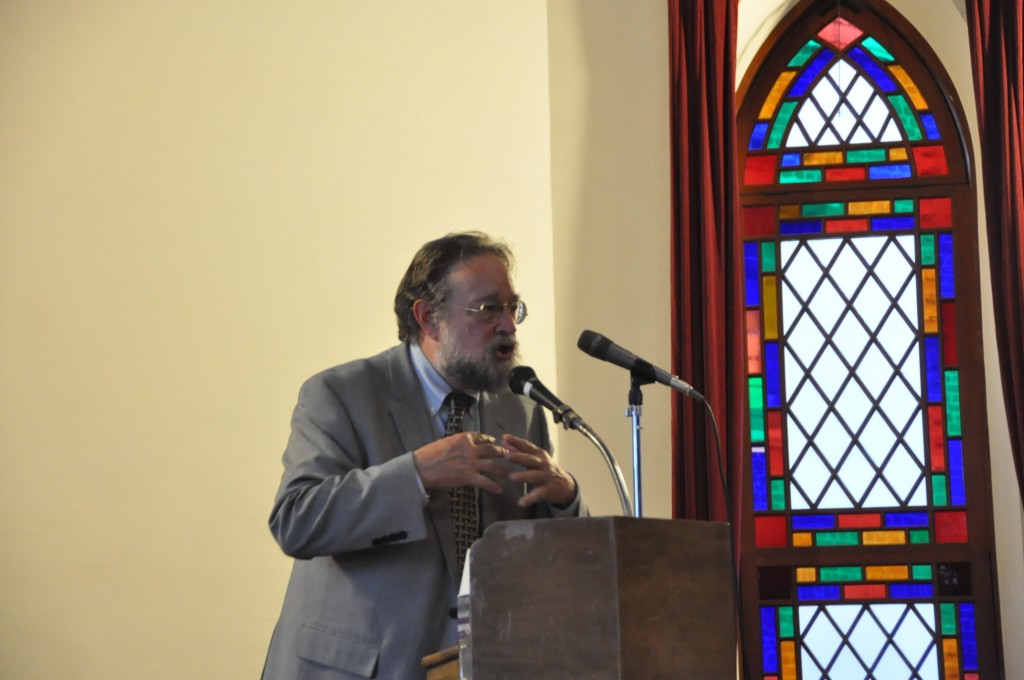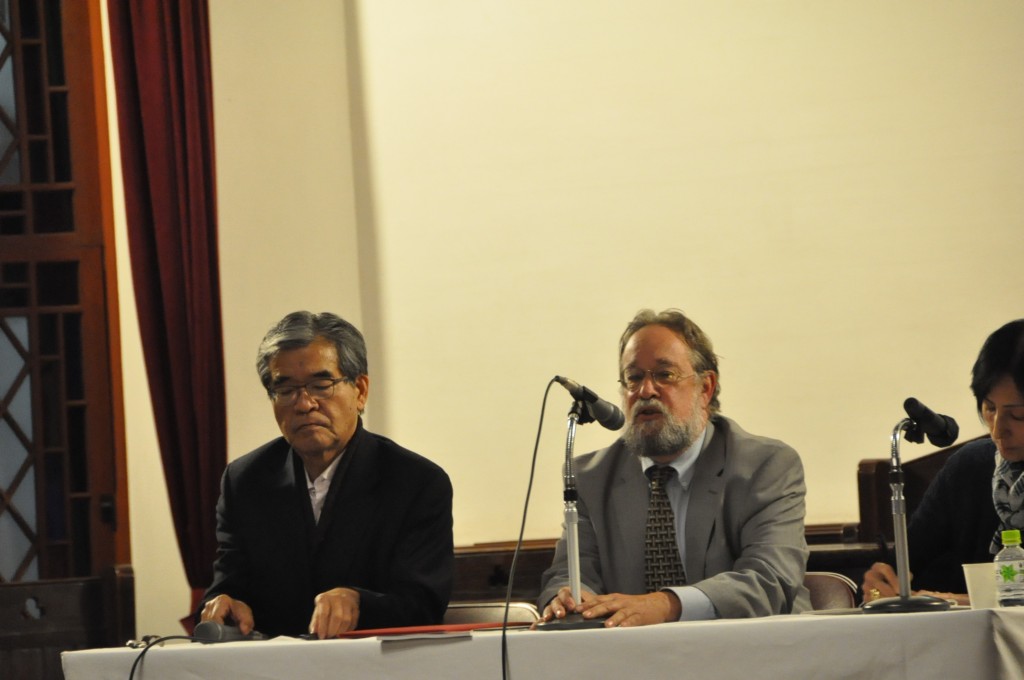Center for Interdisciplinary Study of Monotheistic Religions(CISMOR)Doshisha University
> Public Lectures > U.S. Policy In AsiaPublic Lectures
U.S. Policy In Asia
| Date: |
2015/11/04 16:30-18:00 |
|---|---|
| Place: | Doshisha chapel, Imadegawa Campus, Doshisha University |
| Lecture: | Adam Garfinkle |
| Summary: | |
|
Dr. Garfinkle lectured on national security and U.S. foreign policy from a historical viewpoint. The previous generation’s concept of achieving success in has finished; in its place is a transition period. Looking back at the grand strategy of the United States, the first objective was to secure land in North America; after success in this regard, that mission was completed. Following this were the counter-hegemonic strategies on the two fronts of Europe and East Asia, which was in line with the thinking of Alfred Thayer Mahan. This was attributable to fear of territorial invasion by other countries due to advances in technology and the need to maintain a large military force to cover the possibility of a power in either region appearing. The methods to realize this were to rely on the naval power of Britain, which was still strong at that time, and to increase the naval power of the U.S. itself. In response to the emergence of Germany and Japan as hegemons during the 1930s, the U.S. went to war to pursue its strategies. Following the conclusion of the Second World War, military power was focused on both ends of Eurasia, and many Americans hoped for a new age in which human rights and cooperation between nations were emphasized in international politics, rather than power. However, the subsequent emergence of the Soviet Union in Europe and China in Asia as new hegemons led to the ideology of the Cold War being adapted to geopolitical thinking. Simultaneously with the implementation of Mahan’s strategy, the linked economic system of Bretton Woods (establishing, e.g., the IMF, World Bank) was established, making it possible to ensure the financial strength of Western nations and conferring power to counter the communist countries. Then, a system centered on the U.S. in Asia and Europe was constructed, and the system to take leadership in promoting the counter-hegemony strategy in both regions was born. In addition, the forward deployment of the navy and the air force across Eurasia was emphasized. In essence, the U.S. geopolitically secured the power to maintain U.S. forces in Europe and Asia, which functioned in the form of suppressing competition in terms of security in the two regions. This strategy also succeeded; following the fall of the Berlin Wall, the collapse of the Soviet Union, changes in China, the U.S. has, since the Clinton administration, viewed the power, values, and reputation of the U.S. as being aligned. Therefore, the period to celebrate had arrived, and the grand strategy was no longer necessary. Following the September 11 terrorist attack in 2011, the Bush administration created a new theory and formulated it strategically. The strategy considered that, from the viewpoint of American interests, vigilance is most needed to prevent terrorism by non-state actors leading to a large number of casualties and actively disseminating weapons of mass destruction. However, because the feared threat did not develop further, that role quickly ended. Opinion is divided with respect to how President Obama, who took office in 2009, understood national security and what strategic concepts he had at the time. The Republican Party has criticized the president as desiring the decline of the U.S., intentionally harming relationships with allies by building relationships with enemy states, enacting policies that weaken the strength of the military, and having a naive understanding of the realities of international politics. The GOP has also criticized the policy of offshore balancing to pass responsibility to allies, viewing the president as having no understanding that it is only possible to proliferate such ideas and norms as freedom and democracy if the country possesses a fitting degree of power and reputation. Conversely, supporters of President Obama believe that the Cold War institutions and system of alliances are outdated and obsolete, that they should, therefore, be destroyed, and an important focus should be placed on only the response to terrorism. This thinking is consistent with that of the president. The Obama administration has, in turn, followed the same ideas as the Bush administration, which ironically has been a factor in securing support for him. President Obama and his supporters believe that as the postwar grand strategy changes, there will be an increasing level of uncertainty, but the risks and costs of foreign policy will ultimately decrease, making intervention in disputes unnecessary. The idea is that, in these circumstances, if the U.S. pulls back, another country will rise or the countries in dispute will maintain their own national defense by themselves, or alternatively that dispute resolution in each area will prove effective. There is a useful equation in the field of international politics: “power + will = reputation”; although reputation as a function of policy is thought to create influence, it may be contended that the U.S.’s reputation and influence have been compromised by the current administration. Leaders of the world have tended to regard each crisis that presents itself as an individual crisis, but as global anxiety increases due to accumulated crises, the national security systems are currently collapsing. Dr. Garfinkle thus concluded the lecture and a question and answer session was conducted for the participants. Tomoki Asaka Postddoctral Fellow, CISMOR |
|
|
*Admission Free, No Reservation Necessary. *Lecture in English, Interpretation will be provided. |
|

